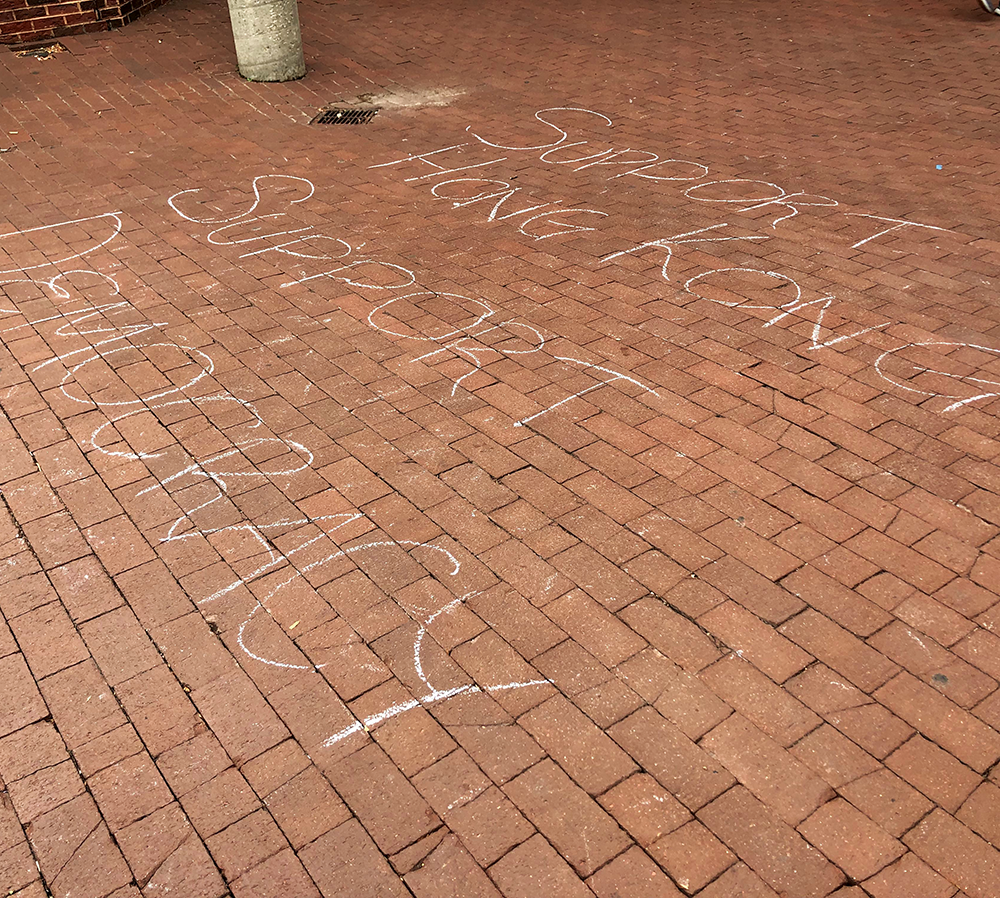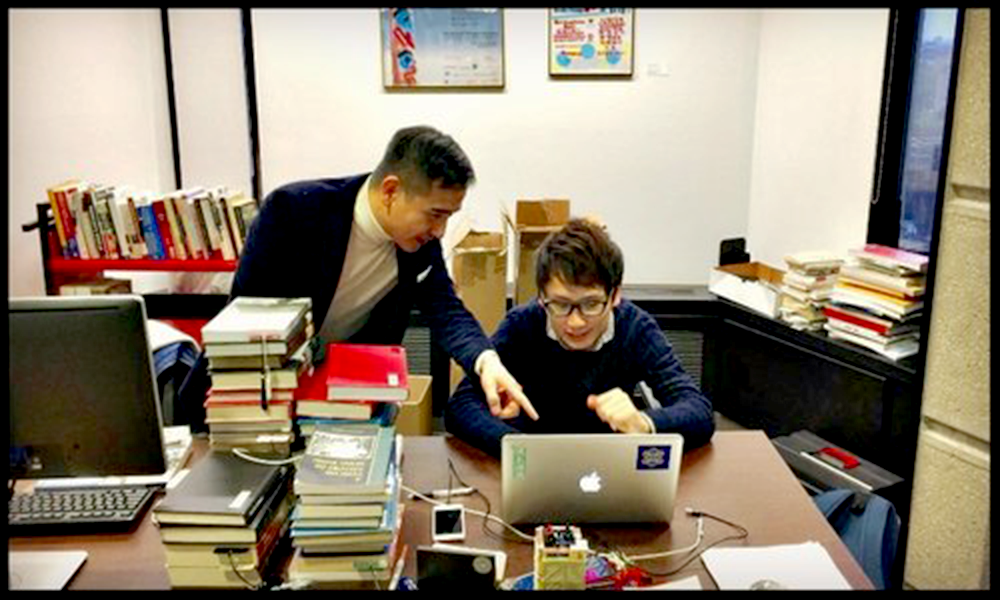Anonymous chalk messages supporting ongoing Hong Kong protests were left in Red Square late last week, leading to a series of back-and-forth notes debating Hong Kong’s relationship with China.
A chalk message stating: “Stop police brutality stop political arrests” appeared in Red Square Friday morning leading someone to respond below: “HK belongs to China!!!” In the ensuing week, more messages in Chinese and English joined the conversation, including “Real Chinese support Hong Kong.” Later, posters with the heading “Hong Kong is a part of China” were left in Red Square and defaced, then disappeared.

Though many of the messages remain anonymous, one known author, Jeffrey Ngo, a Hong Kong native and second-year candidate for a doctoral degree in history, contributed to the pro-Hong Kong chalkings and graffitied the posters. Ngo is the only author who has been identified.
The messages created a discourse and engaged the Georgetown University community in the international protests, according to Ngo.
“They might start to read about it. They might start to talk about it and I think that this would help Hong Kong in terms of generating international exposure,” Ngo said. “Obviously, again, I don’t want any injuries or anything like that but the fact that what is happening in Hong Kong and what’s happening in China, when we see that playing out at an American university it opens a dialogue.”
Months after protests broke out opposing a bill to allow criminal suspects to be extradited to mainland China, tensions and violence in Hong Kong have risen. Hong Kong returned to Chinese rule in 1997 after over 150 years of British colonial rule, and currently exists under a “one country, two systems” policy that allows the region a significant level of autonomy.
Two of Ngo’s friends, student activist leaders Joshua Wong and Agnes Chow, were arrested during demonstrations last week. Though the extradition bill was officially dropped Wednesday, the protests that began in June embody a broader call for democratization and an end to police brutality, Ngo said.
“I think we have shaken the foundations of Beijing’s seemingly impenetrable rule over its subjects and I think, you know, it feels emotional to have left,” Ngo said. “Everybody is talking about police brutality, democratization, people want structural change in Hong Kong and that is going to be a long fight. So that fight is far from over.”
The monthslong protests have turned international attention toward Hong Kong. The global and local conversations in Red Square open a productive conversation, according to Georgetown’s Hong Kong Student Association.

“We do welcome the attention and dialogue our city has attracted these past few months, both in Georgetown and around the world,” a representative from HKSA wrote in a statement to The Hoya. “We hope that this dialogue continues to be respectful, mature, and constructive.”
Georgetown history professor James Millward has chronicled the Red Square messages on Twitter. Millward, who specializes in Chinese history, shared pictures of the chalkings to point out the relationship between the “stop police brutality” comment and the “Hong Kong is a part of China” response.
“My intent really was to point out that non-sequitur and to say, ‘Hey, wait a minute, listen to yourselves,’” Millward said. “I’m not unsympathetic with the concerns of [People’s Republic of China] students at all, but I think that particularly Georgetown students are capable of thinking about it in multiple ways.”
Ngo has long been active in Hong Kong activism and spearheaded student protests in Washington, D.C., that addressed the former Hong Kong chief executive’s resignation and democratic electoral reform. The activism in Washington and on campus could have a far-reaching impact, according to Ngo.
“This is the capital city of the U.S. This is also where think tanks are, policy makers are, reporters are and this institution produces a lot of people who will be in those positions in the near future,” Ngo said. “The additional meaning of having this play out at Georgetown is that it is going to leave a mark on American political discourse in the years to come.”
Georgetown’s Chinese Student Alliance, a cultural club, declined to comment for this story. The Chinese Students and Scholars Association, a graduate student group that previously received funds from the Chinese government, could not be reached for comment.
The Georgetown University Student Association executive branch is preparing an official statement in support of the Hong Kong activists demonstrating for autonomy and civil liberties with peer institutions, according to GUSA Press Secretary Harper Thomas (SFS ’22).
“As democratically elected representatives of the Georgetown University student body, and supporters of a free and democratic society, we believe GUSA has a duty to support the student unions and activists in Hong Kong in their struggle for democracy and freedom from authoritarianism,” Thomas wrote in an email to The Hoya.
The protests encapsulate diverse perspectives within the Hong Kong community, opening both an international conversation and one among Hong Kongers, according to HKSA.
“The protests happening now reflect a wide range of sentiments Hong Kongers have on their history, future, and place in the world,” HKSA wrote in a statement to The Hoya. “HKSA is open to anyone who feels connected to Hong Kong, and thus is not interested in taking an institutional stance that would risk alienating people in our community.”




















